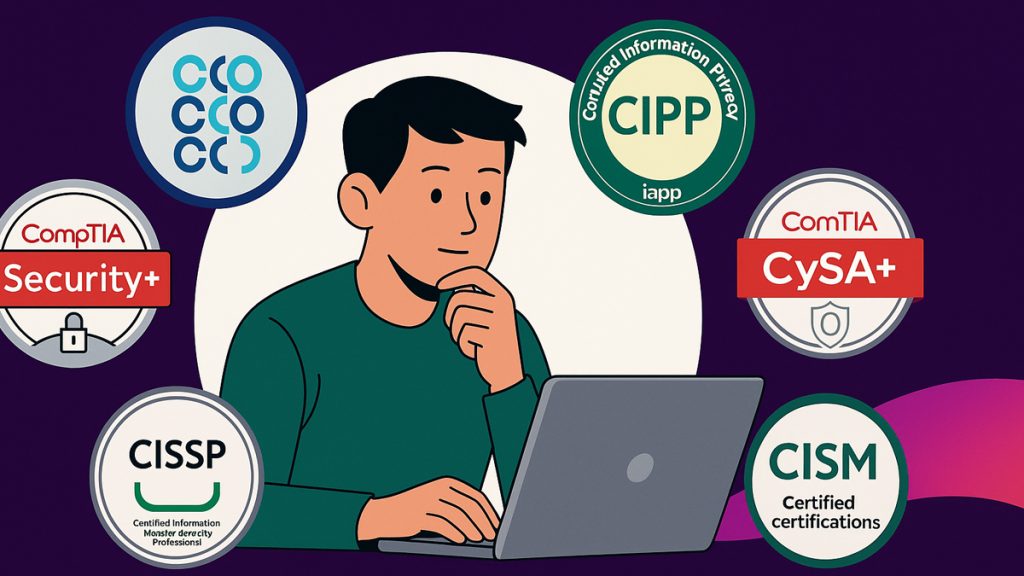Why certs still matter in cybersecurity
Let’s be real—cybersecurity is one of those fields where skill matters more than anything. You can be a phenomenal analyst or a genius with packet captures and still feel invisible during the hiring process. Why? Because sometimes, HR or recruiters need to see your skills written in a language they understand. That’s where certifications come in.
Even in 2025, certs are like passports. They don’t tell the whole story, but they get you through doors. Whether you’re breaking into the industry or trying to pivot from IT into cyber, a certification can signal that you’ve got skin in the game—and the foundation to build on.
And with cybersecurity branching into everything from ethical hacking to risk management to cloud defense, certs also help you specialize. They’re less about showing off and more about showing up ready.
So no, you don’t need every certification. But picking the right one? That can be a game-changer.
Overview of the top 5
There’s no shortage of cybersecurity certifications out there—some great, some… not so much. But here are five that stand out in 2025, depending on where you’re at and where you want to go.
CompTIA Security+ is often the first stop for newcomers. It’s vendor-neutral, covers a wide range of fundamental topics (like threats, networks, cryptography), and doesn’t assume deep prior knowledge. If you’re just getting started or switching from another tech field, this one’s a solid, confidence-building start. It usually costs around $400 and is considered beginner-friendly.
CEH (Certified Ethical Hacker) is for folks who want to dive into the mindset of hackers. Think reconnaissance, exploitation, footprinting—the fun stuff. It’s hands-on and more technical, but still accessible with a bit of prep. Expect to spend about $1,200–$1,500. Great for pentester hopefuls.
CISSP (Certified Information Systems Security Professional) is like a badge of honor in cybersecurity leadership. It’s not for beginners. You need at least five years of experience in two or more domains (or a qualifying degree/cert to waive a year). It’s theory-heavy, expensive (around $800), and geared toward those managing teams or designing enterprise-wide security policies.
CISM (Certified Information Security Manager) is the go-to for those leaning into GRC—governance, risk, and compliance. It’s ideal if you’re interested in security strategy more than hands-on technical work. It also requires experience, and sits at the $760 range. CISM is especially valued in enterprise environments or consulting firms.
Google Cybersecurity Certificate is a newer entry, and honestly, a refreshing one. It’s aimed at total beginners, costs a fraction of the others (about $50/month on Coursera), and focuses on practical, job-ready skills like risk assessment, incident response, and SOC work. It won’t replace something like CISSP, but it’s a great stepping stone—especially if you’re budget-conscious or just testing the waters.
| Cert | Ideal for | Level |
|---|---|---|
| CompTIA Security+ | Beginners and career switchers | Entry |
| CEH | Aspiring ethical hackers | Intermediate |
| CISSP | Security managers/architects | Advanced |
| CISM | GRC professionals, consultants | Advanced |
| Google Cybersecurity Cert | New learners, budget-focused | Entry |
Choosing based on your career goal
So how do you pick the one that fits you? Well, it helps to start with where you want to land.
If you see yourself working as a SOC analyst—those people who monitor alerts, investigate threats, and work in high-energy security operation centers—then Security+ or the Google Cybersecurity Certificate are both great entry points. Later, you might look at something like CySA+ or even CISSP down the road.
If your dream is to become a pentester or red teamer, start with CEH. It’s a decent intro to offensive tools and concepts. Eventually, you’ll want to level up to OSCP or something even more hands-on, but CEH gives you that first taste and often helps land interviews.
For folks leaning into cloud security, things get a little trickier. You might want to start with Security+ to build your base, but then explore AWS, Azure, or Google Cloud-specific certs. Add something like CCSP (Certified Cloud Security Professional) when you’re ready. Think of cloud security as a growing tree—pick your branch early, but be ready to climb further later.
And if you find yourself drawn to compliance, policy, or risk management, skip CEH and head straight toward CISM. GRC might not get all the hacker-hype, but it’s a respected and growing field with real impact—and real job security.
Still unsure? Talk to people in the roles you want. Ask what helped them. Most folks in cybersecurity are surprisingly open to helping others find their path.
Wrap-up: start small, think big
You don’t need to map out your entire career today. Start with what excites you—or at least what makes sense with where you are now.
Certifications aren’t magic, but they do get noticed. Choose one, commit, and let it open the next door. The rest? That comes with time, curiosity, and a few late nights in Wireshark.
Certs open doors, but curiosity keeps you walking through them.








